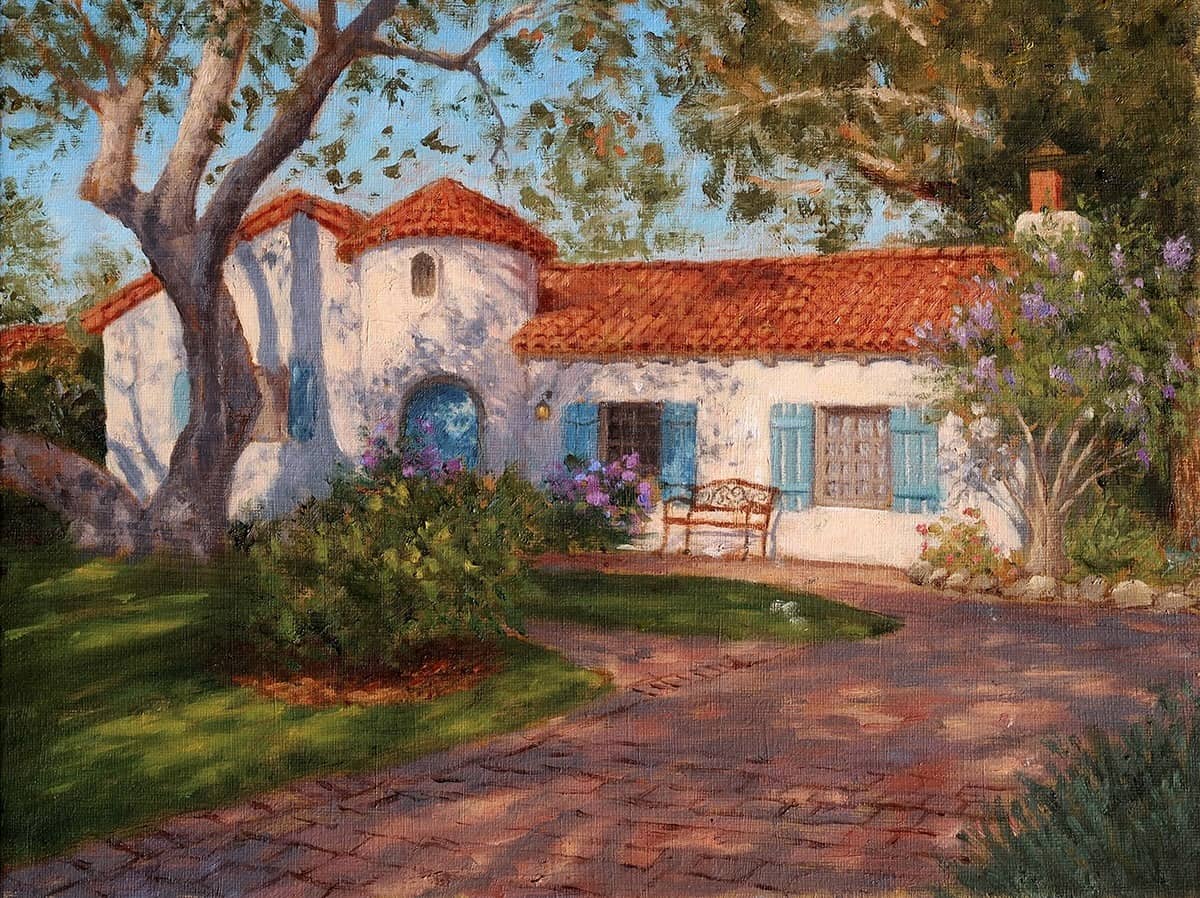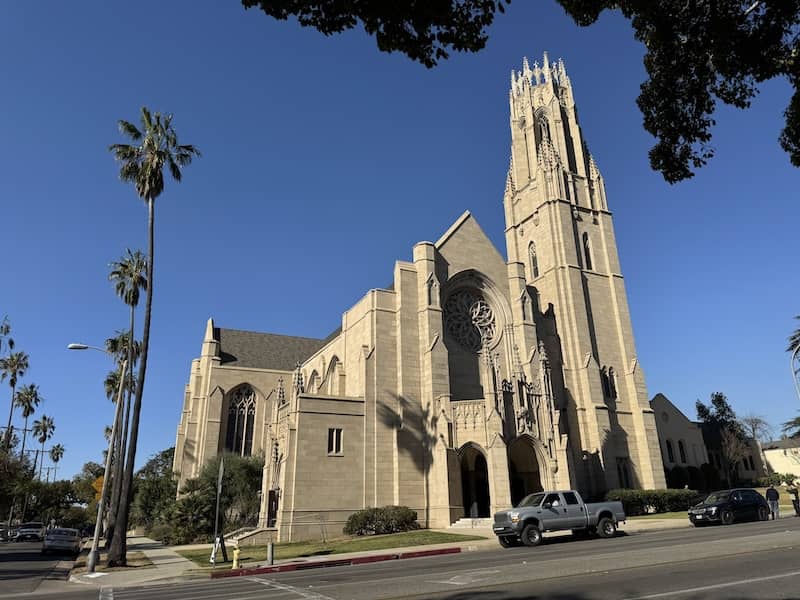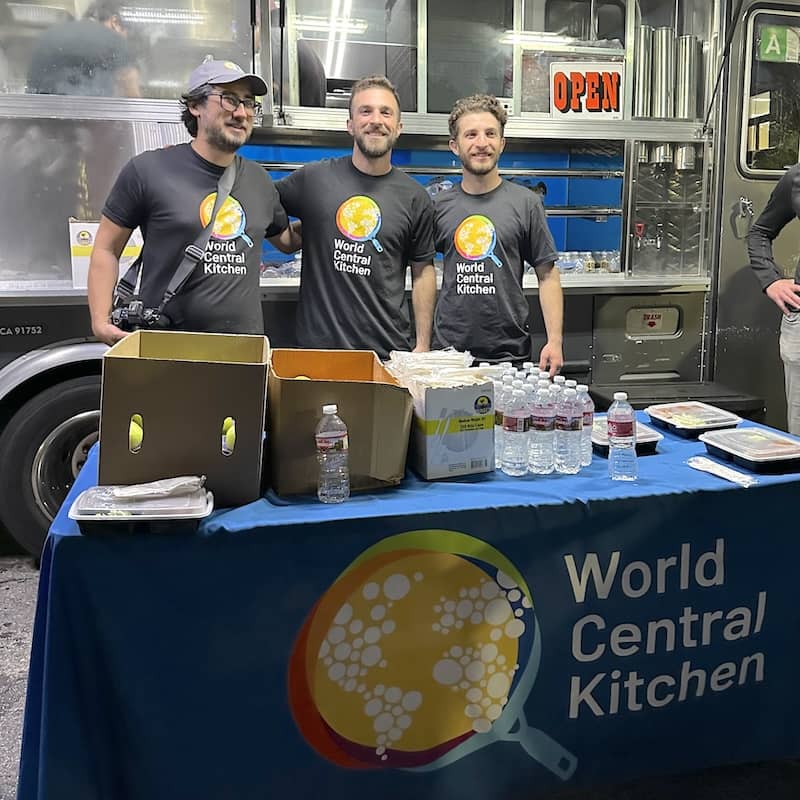We have thousands of human-written stories, discussions, interviews and reviews from today through the past 20+ years. Find them here:
Concert Reunites Neighbors Following LA Fires
"Are things getting better?"
A well-meaning young student asked me this question, referring to January fires that burned down most of the community of Altadena, Calif., just two miles to my north. She lives in a different part of town and just wanted to know how things were going.
I had no easy answer for this question.
"The problem is," I said carefully, "that you can't un-burn down someone's house, once it has burned down."
Tens of thousands of people - 7,000 homes in Altadena, and another 6,000 in the Pacific Palisades - no longer have that place that they called home for years, or decades, or even generations. They don't have their neighborhood, their school, their church, their grocery store, their park. Everyone had to leave, so they might not ever see certain people again - their neighbors, the characters in their daily lives. They definitely never will see certain places again, because those places no longer exist.

Pasadena artist Johanna Girard created this beautiful painting last year - she took frequent walks in Altadena and was inspired one morning by this house. She didn't know who lived in it, but after the fires she offered it up on Facebook, hoping to find its owner and give them the painting as a remembrance.
Another student - whose school had burned down, had told me that in her class of 28 students, 24 of them had lost their homes. I'm still reeling from that fact. Six weeks later, people are still just trying to work out where they can stay for the foreseeable future. Most aren't ready to move on to the idea of replacing their belongings, beyond anything but the barest essentials.
But they miss each other. They miss their life, they miss their things. And on top of that they have to negotiate a whole different world.
On Sunday my violinist friend Irina Voloshina - who lost her Altadena house and nearly all of her belongings in the January 7 fire - presented a concert, part of her Melodia Mariposa concert series she had founded in 2020. With all the hardship she faced from her losses, she had considered cancelling the scheduled concert - but then she decided to use it to raise funds for victims of the fire.
Irina's concert series had been born when she held concerts for her neighbors, in front of her house on Mariposa Street during the pandemic. It had grown into a well-respected and award-winning concert series with concerts in four different venues. But it always stayed connected to her neighbors - and now many of them had also lost their homes in this fire. Flyers for the concert, which featured the wonderful LA-based Lyris Quartet, said "Altadena Strong - We Will Rebuild."
Of course I wanted to be there. So on Sunday I headed up Lake Street, toward the sweepingly tall Westminster Presbyterian Church, where the concert would take place. It's a beautiful and historic French Gothic building. Its 150-foot tower has stood as a regal landmark - the juncture between Altadena and Pasadena, north and south, since 1928.

Westminster Presbyterian Church in Pasadena.
It now marks something else - the border between the burn zone and not, between what used to be and what still is. This was the second time since the fire that I had headed this far north. Two weeks ago - about a month after the fire - my husband, daughter and I got in the car and drove straight north from our place until it became the burn zone. We had decided, with careful consideration, that we needed to see what had happened to this area just a few miles from us, a place that was such an essential part of our lives for 25 years.
As we drove farther, we encountered a warning sign right in the middle of Altadena Street: "Caution, you are entering an area affected by wildfire, enter at your own risk." And that is where it started: some homes remained intact, some were burned to the ground. We rounded the corner, driving past that homes that line the edge of Eaton Canyon. As we went, everything changed from color to black and white - ash has no color, just shades of gray. We saw two of my students' school, St. Mark's - most of it simply gone, except for some framing and oddly, a staircase to nowhere, now out in the open.
And then we entered the area of complete destruction - blocks and blocks of homes burned. Without the homes there, the sun filtered down in strange ways, and we could see to the distant valley in a way we couldn't before. It was easy to get lost, with familiar landscapes gone, and the few that remained now visible in new ways. We went to a block we knew - but we couldn't tell the houses we knew from the ones we didn't. Strange things remained - how did the wooden chair in the yard remain, when the entire house burned down? And the few bits of color - a ceramic planter in the yard, or a few colored tiles from the garden steps.
It felt like a graveyard, a place of silence and stillness, where time had stopped. We suspected we might be seeing homes that owners had not yet returned to. Some people had come back to sift through the ashes. (One of my friends posted a picture of herself and her husband, dressed head-to-toe in protective gear, in front of their destroyed home, with the caption, "Ready to Rubble!") But some had not been able to bring themselves to do it. On this block everything felt untouched by anything but the fire. Burnt down, but still in place. We all felt a reverence. No way would we take any pictures, it felt too private. But there were also signs of impending change - trucks driving through to begin the clean-up process. There were no residents, but there were workers.
Sunday's concert marked another kind of juncture: a juncture in time. On Sunday night, that land of ruin was still standing - the remains of all that was. But massive removal of ash and debris would start the next morning, with certain streets designated to become busy thoroughfares for 1,500 truckloads of debris per day, as they transport 2.5 million tons of debris from 9,000 properties. I was glad that we had decided to visit the area during that strange moment of suspension, before time moved on and everything changed very radically.
These images flashed heavily before me as I entered the parking lot behind Westminster church on this hazy late afternoon. Walking to the door I met a woman who was Irina's neighbor - a photographer who had been taking pictures of the concerts since those early pandemic concerts in the driveway. I asked her the question that is now customary among people in this area, "How are you, are you okay? How is your house?"
"I lost everything in the fire."
We entered the church and found a robust crowd - about 350 people filled the pews. I caught bits of conversation that made it clear that many people were from Altadena: people were asking one another, "Where are you now?" They were talking about living with friends, about trying to find a longer-term living situation, about the impending clean-up, about re-building. I also recognized other friends and musicians, people who had come from all across Los Angeles to hear the music and show their support.
I'd never been inside this church, and what a beautiful interior - painted ceilings, ornate woodwork, elaborate stained glass windows and a giant pipe organ. I sniffed the air - remarkably clean. In her introductory words, Irina told us that, in addition to losing her own home, Melodia Mariposa had lost three of their regular concert venues to the fire - Westminster was the only one that had not burned down.
She asked everyone who had lost their homes in the fire to stand up, and at least 25 people in the audience stood.
"I'm not alone, you're not alone...and it helps," Irina said. "This is our last standing venue, and we are still here. I feel the love and strength from you, and it helps. We have to believe we are strong, we have to believe we are creative. Together we will rise again."
With this, Irina introduced Alan Chapman, the classical KUSC radio host on hand to narrate program notes, as well as the Lyris Quartet, comprised of violinists Alyssa Park and Shalini Vijayan, violist Luke Maurer and cellist Timothy Loo.

L-R: Alan Chapman, Irina Voloshina and the Lyris Quartet - Luke Maurer, Timothy Loo, Shalini Vijayan and Alyssa Park.
Alan began by talking about an idea from the ancient Greeks: music's power to heal the soul, the spirit, and even the human body. Perhaps it can even heal communities.
And then we were treated to an evening of energetic and on-point playing, with a program that included two works by living composers, followed by two lesser-known works by well-known composers of the past.
The first piece was a quartet by film composer Bruce Broughton called Fancies - and in fact, Bruce emerged from the audience to introduce it. He had written the piece in 2015 for the Lyris Quartet, and it appears on their album Intimate Letters. The album features the second quartet by the Czech composer Leoš Janácek, and "Fancies" was commissioned as a response to that work.
This was followed by a piece that I know and love, Jessie Montgomery's 2006 Strum. Chapman quoted a critic who called the work "an early candidate for 'classic'" - and I have to agree. The Lyrus Quartet was all over the its groovy rhythms and many styles of string-plucking, from regular pizzicato to guitar-style strumming to rhythmic up-down, over-the-string chords. They managed to get across the piece's angularity - an accomplishment when working with large-church acoustics.
Next Brandon Jay and his neighbor Ed came to the front to describe a project called Altadena Musicians - they have been collecting instruments to pair with musicians who lost them in the fire. (This is a separate effort from the Pasadena Symphony's instrument drive, which focuses mainly on young students - but I understand they are coordinating.)
They emphasized that they would be there when people were ready - "If I got all my stuff back right now it wouldn't do me any good," Jay said, because he is in a temporary rental situation and not sure where he'll be next. But when people are ready, "we'll get you covered."
The next musical selection was a surprise and a delight, a piece that German composer Anton Webern wrote in 1905 - before his 12-tone days - called "Langsamer Satz." Alyssa introduced it as a "love song to the woman he would later marry," and said that instead of having a moment of silence for all that everyone has lost, "We dedicate this piece to you, with love." (Have a listen here)
It's heartfelt and poignant music, and these musicians played its flowing melodies with great expression.
The concert concluded with the epic four-movement String Quartet in G minor, Op. 27 by Edvard Grieg. Chapman told us that the composer aimed for a feeling of "soaring flight" and "resonance" for all the instruments - and this was certainly true. The piece was full of intensity, high emotion and energy throughout. It's also mercurial - just when it settles into one theme there is an interjection or interruption. This was virtuosic quartet playing, with Grieg requiring - and Lyris giving - over-the-top energy right to the victorious end.
After the concert, Irina pointed out that she would normally have a party at her house, but with that now impossible, World Central Kitchen was on hand - and the party would be in the parking lot behind the building, next to their food truck. And indeed, neighbors, friends and music lovers lingered outside in the dark, well after the concert.

If you wish to contribute Melodia Mariposa's GoFundMe to Supports Eaton Fire-Affected Musicians, click here to reach that website.
You might also like:
- Pasadena Symphony Helps Community Grieve and Give After Fires
- Fire
- After the Fire
- Help for Musicians, Teachers and Schools Affected by Los Angeles Fires
* * *
Enjoying Violinist.com? Click here to sign up for our free, bi-weekly email newsletter. And if you've already signed up, please invite your friends! Thank you.
Replies
This article has been archived and is no longer accepting comments.












February 19, 2025 at 12:07 PM · Thanks Laurie Niles, for this touching report. Heartening to read of the solidarity in the community that lost so much.